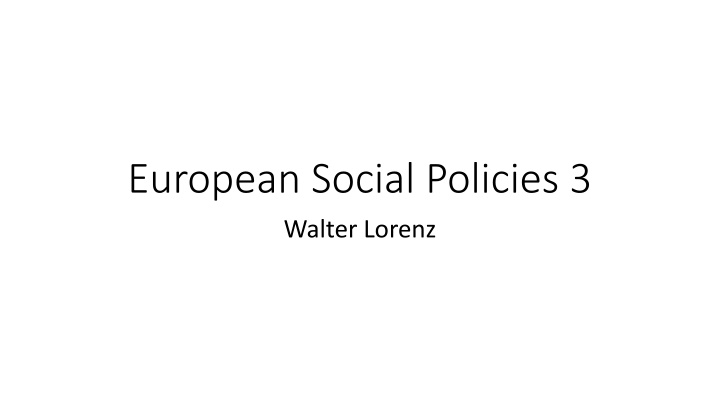European Social Policies and EU Limits: A Comprehensive Overview
EU social policies are guided by the principle of subsidiarity, ensuring decisions are made close to the citizens. The EU's role is to set framework conditions and compensatory programs, while social policy largely remains the responsibility of individual member states. The Union can act in a policy area if it aligns with its competences, respects subsidiarity, and maintains proportionality. Social objectives include promoting well-being, full employment, combating social exclusion and discrimination, and ensuring social justice and protection.
Download Presentation

Please find below an Image/Link to download the presentation.
The content on the website is provided AS IS for your information and personal use only. It may not be sold, licensed, or shared on other websites without obtaining consent from the author.If you encounter any issues during the download, it is possible that the publisher has removed the file from their server.
You are allowed to download the files provided on this website for personal or commercial use, subject to the condition that they are used lawfully. All files are the property of their respective owners.
The content on the website is provided AS IS for your information and personal use only. It may not be sold, licensed, or shared on other websites without obtaining consent from the author.
E N D
Presentation Transcript
European Social Policies 3 Walter Lorenz
Limits to EU making social policies The principle of subsidiarity determines when the EU is competent to legislate, and contributes to decisions being taken as closely as possible to the citizen (article 5 of the Treaty on European Union). This means: social policy remains largely the responsibility of the single member state and the EU can only determine framework conditions and compensatory programmes (European Social Fund, European Regional Fund )
subsidiarity The Union can therefore only act in a policy area if: the action forms part of the competences conferred upon the EU by the Treaties (principle of conferral); in the context of competences shared with Member States, the European level is most relevant in order to meet the objectives set by the Treaties (principle of subsidiarity); the content and form of the action does not exceed what is necessary to achieve the objectives set by the Treaties (principle of proportionality).
John Paul II 1991 By intervening directly and depriving society of its responsibility, the Social Assistance State leads to a loss of human energies and an inordinate increase of public agencies, which are dominated more by bureaucratic ways of thinking than by concern for serving their clients, and which are accompanied by an enormous increase in spending. In fact, it would appear that needs are best understood and satisfied by people who are closest to them and who act as neighbours to those in need .
EU social objectives Article 2 of the Treaty on European Union states that the Union s aim is to promote the well-being of its peoples and beside a highly competitive social market economy it aims at full employment and social progress . It also states It shall combat social exclusion and discrimination, and shall promote social justice and protection, equality between women and men, solidarity between generations and protection of the rights of the child .
EU social policy initiatives 1994 White Paper European Social Policy: a WayForward for the Union - shared values: democracy and individual rights, free collective bargaining, the market economy, equal opportu-nities for all, social welfare and solidarity 2000 European Council at Nice confirms principles 2000 Lisbon Strategy making EU "the most competitive and dynamic knowledge-based economy in the world capable of sustainable economic growth with more and better jobs and greater social cohesion" by 2010 cont.d
2001 Communication on Employment and SocialPolicies: a Framework for Investing in Quality 2005 European Values in a Globalised World: unity and diversity in shaping economic and social policies Overview of regional integration policy: https://ec.europa.eu/regional_policy/en/policy/what/history/
EU Instruments with social implications European Social Fund (ESF): main instrument for supporting jobs, helping people get better jobs and ensuring fairer job opportunities for all EU citizens. It works by investing in Europe s human capital its workers, its young people and all those seeking a job. ESF financing of EUR 10 billion a year is improving job prospects for millions of Europeans, in particular those who find it difficult to get work view: https://ec.europa.eu/esf/videos_include.jsp?mode=1&videoId=2521&vl =en&langId=en
European Regional Development Fund (ERDF): 'thematic concentration on key priority areas: Innovation and research; The digital agenda; Support for small and medium-sized enterprises (SMEs); The low-carbon economy.
Cohesion Fund: set up in 1994, provides funding for environmental and trans- European network projects in the Member States whose gross national income per capita is less than 90% of the EU average. The Just Transition Fund is a new instrument of the Cohesion Policy 2021- 2027, as the first pillar of the Just Transition Mechanism in the context of the European Green Deal aiming at achieving the EU climate-neutrality by 2050. REACT-EU is a legislative proposal to repair the social and economic damage caused by the COVID-19 pandemic, and to prepare for a green, digital and resilient recovery. REACT-EU seeks to mobilise an additional EUR 58 billion for the structural funds in the 2020-2022 period, and to increase flexibility in cohesion policy spending
In 2007 the European Globalisation Adjustment Fund (EGF) started with a budget of some 500 million euro a year. Its aim is to help workers made redundant as a result of changing global trade patterns to find another job as quickly as possible. In the EU budget for 2006 some 9.9 percent went to the policy area Employment and social affairs . It was the third largest policy area after Agriculture and rural development (45.2 percent) and Regional policy (23.8 percent). Some commentators have thus concluded that, contrary to popular belief, the level of financial resources deployed by the EC by way of redistributive social policy is considerable (Falkner 2006). However, like most of EU social policy, ESF expenditures are also subordinated to economic objectives: employment, the workforce, competitiveness, growth. Thus, the ESF is also an instrument for economic efficiency rather than for redistribution (social justice). (Stanis awa Golinowska, Maciej ukowski, in Diversity and Commonality in European Social Policies: The Forging of a European Social Model, 2009, p. 303)
The economisation of social policy in the EU While social policy responsibilities in the EU remain largely national responsibility, the creeping (or rampant) privatisation of social and health services in member states brings those areas more and more under the influence of EU competition law: Problems are emerging as a consequence of marketization and the partial privatization of social policy. For example, obligatory pension funds (like those in Poland) are part of the obligatory and universal pension systems, and thus of social policy, with national competence. On the other hand, they are managed by private financial institutions operating on the financial market, with strong EU rules on competition and basic freedoms. One conflict between the national competence in social policy and EU competence in competition and the freedom of services may also concern other parts of social policy, such as health care especially in the case of the competition between health care providers. Thus, the deepening of economic integration has consequences for social policy. This influence of the EU on the social policies of member states may be described as the Europeanization (in the EU sense) of social policy by the back door through progress in economic integration, without a clear strengthening of EU competencies in social policy (Stanis awa Golinowska, Maciej ukowski, 2009, p. 315)
Example: Lisbon Strategy 2008 coordination of social policies was decided by the Member States in the European Council in March 2000, when the Lisbon Strategy was launched.One of its aims was to modernise the European social model, to invest in people and to combat social exclusion by using the Open Method of Coordination (OMC). It seems that, at its origins, the Lisbon Strategy was an attempt to put social priorities on a similar level as economic policies (Goetschy 2014), even if economic governance was dominant in the Treaties.
Priority of economic over social policy Lisbon Treaty 1. The Member States shall coordinate their economic policies within the Union ( ). 2. The Union shall take measures to ensure coordination of the employment policies of the Member States ( ). 3. The Union may take initiatives to ensure coordination of Member States social policies . The way the three paragraphs are formulated shows a hierarchy, which gives priority to economic policies over employment policies and especially over social policies.























